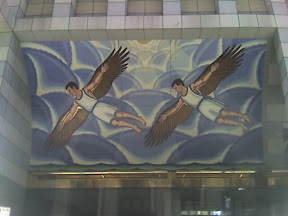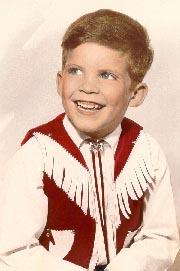 I've been wondering for years about the huge mural above the outside doors of 120 N. LaSalle Street in Chicago. I see it every time I pay a dog- or car-related fee across the street at the City and County Building, as I did today.
I've been wondering for years about the huge mural above the outside doors of 120 N. LaSalle Street in Chicago. I see it every time I pay a dog- or car-related fee across the street at the City and County Building, as I did today.I'm not the only one to wonder about this mural, which is planted in a business- and government-heavy part of Chicago and is obviously a reference to the Icarus myth. (Think: imprisonment, freedom, invention, joy, danger, loss and hubris.) Some ideas that I Googled up:
- "Maybe it's a metaphor for a high-risk loan?" (Artamnesia)
- "[A]n illustration of a tale about greed in Chicago's corporate epicenter" (Joanne Hinkel)
But -- one long line and a lot of Treo-based browsing later -- I now think that the mural's message is a little less obvious and more personal.
Read the following passage from Bulfinch's The Age of Fable and you'll see what I mean. As you read it, keep in mind a few things about the mural's creator, Roger Brown. He'd come from a very conservative religious family in Alabama and had become a significant Chicago artist. He was a well-respected member of Chicago's gay community. He'd installed the mural in 1991, a few years after he discovered that he had AIDS and about six years before that disease killed him.
"Daedalus built the labrynth for King Minos, but afterwards lost the favour of the king, and was shut up in a tower. He contrived to make his escape from his prison, but could not leave the island by sea, as the king kept strict watch on all the vessels, and permitted none to sail without being carefully searched. “Minos may control the land and sea,” said Daedalus, “but not the regions of the air. I will try that way.” So he set to work to fabricate wings for himself and his young son Icarus. He wrought feathers together, beginning with the smallest and adding larger, so as to form an increasing surface. The larger ones he secured with thread and the smaller with wax, and gave the whole a gentle curvature like the wings of a bird. Icarus, the boy, stood and looked on, sometimes running to gather up the feathers which the wind had blown away, and then handling the wax and working it over with his fingers, by his play impeding his father in his labours. When at last the work was done, the artist, waving his wings, found himself buoyed upward, and hung suspended, poising himself on the beaten air. He next equipped his son in the same manner and taught him how to fly, as a bird tempts her young ones from the lofty nest into the air. When all was prepared for flight he said, “Icarus, my son, I charge you to keep at a moderate height, for if you fly too low the damp will clog your wings, and if too high the heat will melt them. Keep near me and you will be safe.” While he gave him these instructions and fitted the wings to his shoulders, the face of the father was wet with tears, and his hands trembled. He kissed the boy, not knowing that it was for the last time. Then rising on his wings, he flew off, encouraging him to follow, and looked back from his own flight to see how his son managed his wings. As they flew the ploughman stopped his work to gaze, and the shepherd leaned on his staff and watched them, astonished at the sight, and thinking they were gods who could thus cleave the air.
They passed Samos and Delos on the left and Lebynthos on the right, when the boy, exulting in his career, began to leave the guidance of his companion and soar upward as if to reach heaven. The nearness of the blazing sun softened the wax which held the feathers together, and they came off. He fluttered with his arms, but no feathers remained to hold the air. While his mouth uttered cries to his father it was submerged in the blue waters of the sea which thenceforth was called by his name. His father cried, “Icarus, Icarus, where are you?” At last he saw the feathers floating on the water, and bitterly lamenting his own arts, he buried the body and called the land Icaria in memory of his child. Daedalus arrived safe in Sicily, where he built a temple to Apollo, and hung up his wings, an offering to the god."
The mural's full title is Arts and Sciences of the Ancient World: the Flight of Daedalus and Icarus.


No comments:
Post a Comment